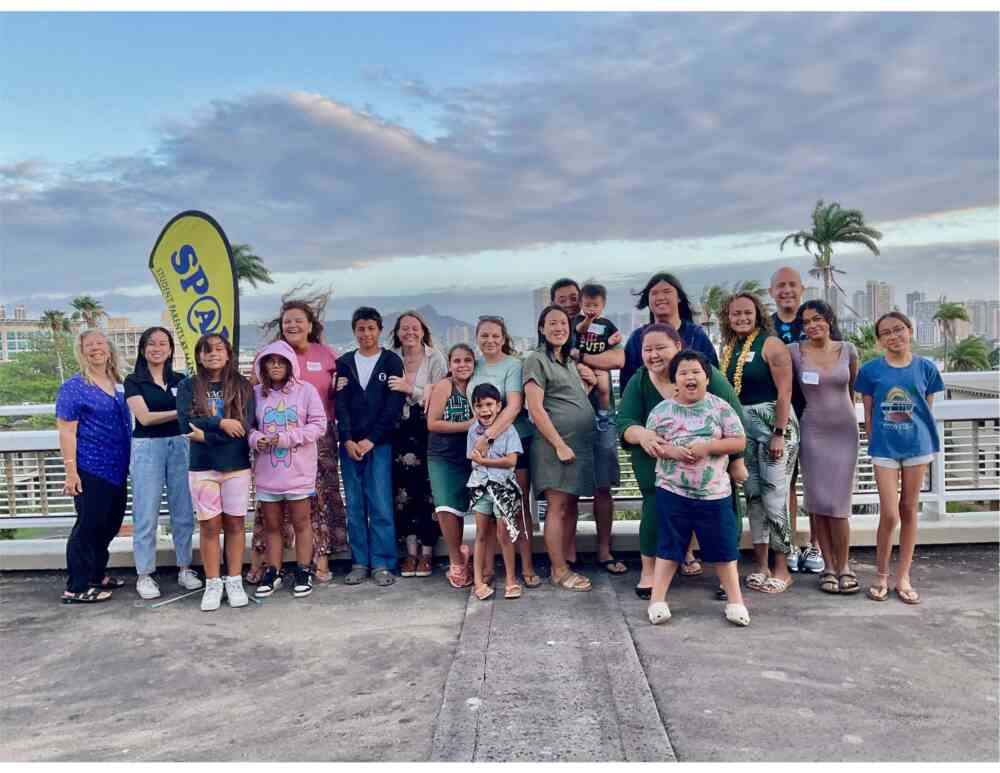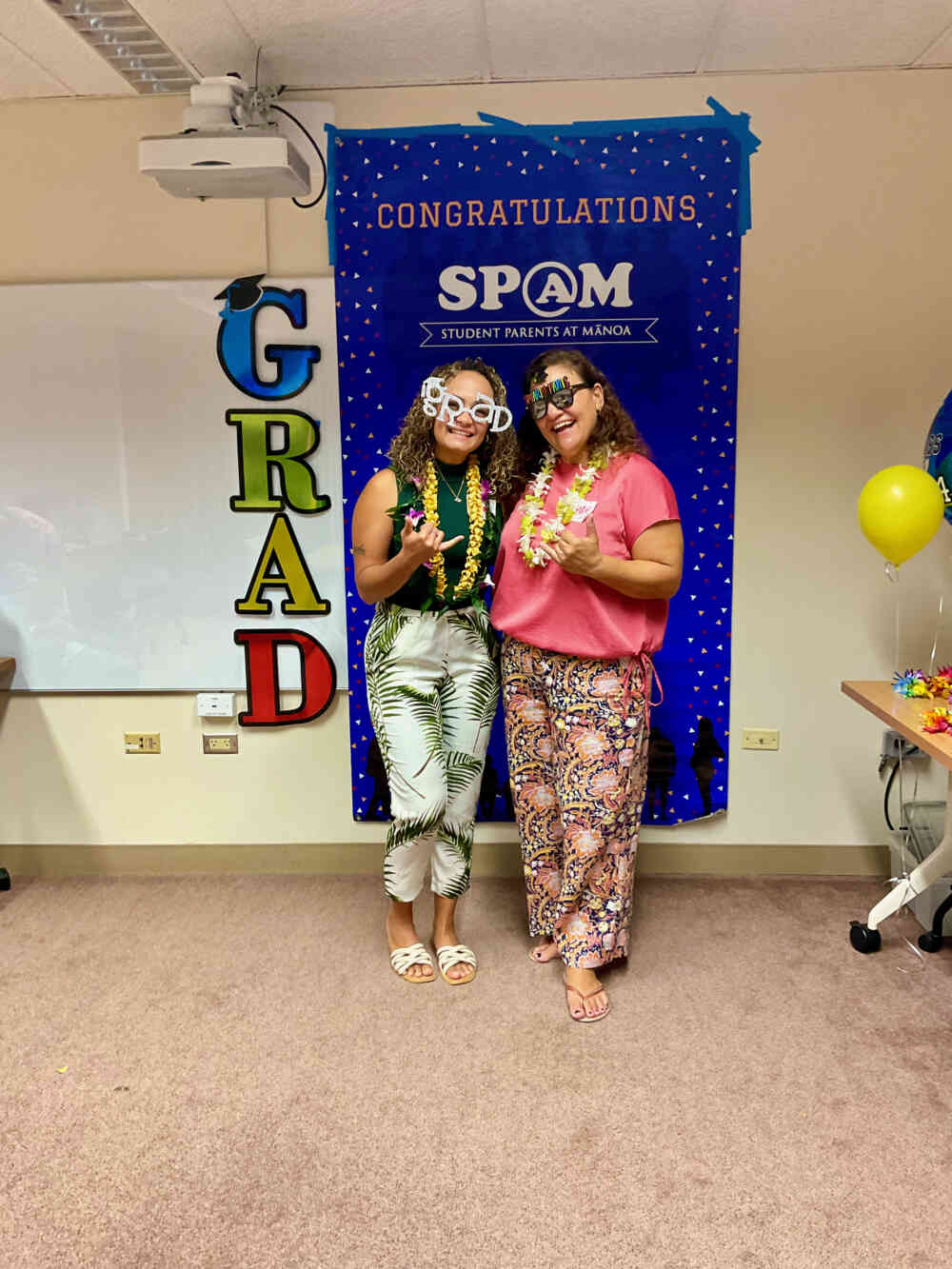Promoting Success: Student Parents At Mānoa (SPAM)
In this inaugural SPARK blog post, we highlight an initiative to support student parents at the University of Hawaiʻi at Mānoa. Profiling a program does not imply endorsement by the SPARK Collaborative.
Aloha nui loa (warm greetings)!
Recently, I spoke with Angie Solomon, Program Coordinator at Student Parents At Mānoa (SPAM), and Teresa Bill, who coordinates the Bridge to Hope program, in the stunning ʻāina (land) of Hawaiʻi. Both work closely to support student parents at the University of Hawaiʻi at Mānoa, in distinct and complementary roles. Bridge to Hope is a systemwide University of Hawaiʻi program that partners with the Hawaiʻi Department of Human Services, supporting students receiving Temporary Assistance for Needy Families (TANF).
Teresa’s role focuses on helping students meet state work requirements in a manner that supports academic success, access campus employment without reducing their benefits, and navigate both welfare and education bureaucratic systems. Meanwhile, SPAM offers broader support to all student parents on campus, helping students build community, connect to resources, and celebrate their academic journeys. Together, Angie and Teresa are key players in a student-parent ecosystem that blends institutional, community, and public support for students and their families.
Angie brings extensive experience and insight as both a parent and a professional dedicated to supporting student families. Although she is not currently a student parent, she plans to return to school to pursue her PhD. Her deep understanding of parenting, along with a strong commitment to care and community, plays a vital role in shaping SPAM’s inclusive and meaningful programming.
SPAM’s signature annual celebration gathers student parents, loved ones, and supporters for a meaningful dinner event honoring their extraordinary accomplishments. Held in a beautiful space on campus, this May celebration is what Angie describes as “the highlight of the entire year,” intentionally designed to welcome children and accommodate family schedules. As Angie shared,
“Witnessing our student parents receive their diplomas while managing both family responsibilities and academic pursuits is truly remarkable.”

Image Description: Several recent graduates of the University of Hawai'i at Manoa pose with their children and families. Photo courtesy of Angie Solomon and Theresa Bill.
The photos Angie shared from SPAM’s past graduation celebrations capture powerful moments of joy and pride as student parents complete their degrees with their children present to witness their achievements. These images tell a story that words alone cannot convey—the culmination of years of persistence, sacrifice, and determination.
Angie shared that these celebrations represent more than academic achievement: they mark the culmination of a journey filled with moments when many student parents considered giving up, thinking, “this is too tough, I can’t do it.” Seeing these same students walk across the stage with their children cheering them on demonstrates the transformative power of community support through the most challenging times.

SPAM works to support student parents by creating community and connection and offering child-friendly campus resources, culminating in a multigenerational effect on students and their children. While challenges still exist for student parents at the University of Hawaiʻi at Mānoa—parking and housing were two that came out strongly during my visit—below I highlight several ways that SPAM is working to make things easier for student parents.
Image Description: Two women pose in front of a "Congratulations SPAM" backdrop with GRAD signage. The celebration continues!
Community and Connection
What impressed me most was SPAM’s ability to foster authentic, multilayered connections for student parents—connections to each other, to supportive staff, to campus resources, and to vital community agencies. These relationships reduce isolation, offer emotional and practical support, and help build a sense of ohana (family) that extends beyond the classroom. As Angie shared, their goal is to foster community and ensure student parents “know they’re not the only one going to college and balancing family and work.”The program meets student parents where they are, recognizing the unique challenges they face in balancing academics with family responsibilities. SPAM’s welcoming hub in the Queen Liliʻ'uokalani Center for Student Services serves as a gateway to campus and community resources. Weekly drop-in hours with free coffee and snacks create casual opportunities for camaraderie, while family-friendly weekend events welcome children and help build a supportive community network.
SPAM extends this sense of connection through strategic partnerships with community agencies that address students’ diverse needs beyond academics. Rather than directly providing these services, SPAM acts as a referral hub, linking student parents to trusted organizations that offer critical support. The strongest connection point is in Teresa Bill’s role in bridging the college with state human services supports, including cash assistance, SNAP, Childcare, and Medicaid. Through a partnership with Helping Hands Hawaii, SPAM aids student parents in joining the Adopt a Family holiday program, which provides children’s gifts and gift cards for meals. SPAM also refers families to the Community Clearinghouse for free furniture, dishes, and other household items, and links parents with Ready to Learn, a program that supplies free school kits for K–12 children.
These community connections, facilitated by SPAM staff, ensure that student parents receive support not only on campus, but also within the broader community—helping them meet essential needs as they pursue their education.
Child-Friendly Campus Resources
SPAM has collaborated with the University of Hawaiʻi at Mānoa Children’s Center to create a comprehensive map of child-friendly locations across campus. This resource helps student parents navigate the university with their children, highlighting 22 locations including
- The Children’s Center
- Areas with children’s books and learning resources
- Family-friendly dining spots
- Gardens, ponds, and outdoor spaces perfect for breaks with children
- Locations of unisex bathrooms
- The Women’s Center lounge with toys and resources
These thoughtful additions to campus life demonstrate SPAM’s holistic approach to supporting student parents by making the entire university environment more accessible and welcoming to families.
Multigenerational Influence
By creating an environment in which caregiving while studying is normalized and celebrated, SPAM helps build educational aspirations across generations. Perhaps most striking was Teresaʻs insight that the children of SPAM & Bridge to Hope participants speak confidently about when, not if—they’ll attend college. This powerful observation illustrates the program’s potential beyond immediate academic success. When children witness their parents pursuing higher education despite challenges, it transforms their perception of what’s possible. Research shows that seeing a parent go back to school inspires more educational achievement among children.
What’s Next
SPAM recognizes student parents’ expertise in understanding their own needs. Angie expressed hope for forming a compensated student-parent advisory group to guide the program’s development, recognizing that while student parents have vital insights, their time is precious and should be valued accordingly.
SPAM will continue to advocate for student parents at the University of Hawaiʻi at Mānoa. In sharing insights from their experience supporting this unique student population, Angie and Teresa discussed the importance of understanding student parents’ complex needs, including access to reliable child care and specialized academic support. Angie and Teresa remain committed to collaborating with campus partners to enhance resources that enable these students to thrive academically while balancing family responsibilities.
As universities nationwide work to better support diverse student populations, programs like SPAM serve as an example of how intentional support for student parents can create pathways to success that benefit individuals, families, and institutions. The impact of supportive environments can extend far beyond graduation, creating lasting change across generations.
Connect with the Community
Are you parenting while studying at the University of Hawaiʻi Mānoa without SPAM support? Connect with Angie at gotkids@hawaii.edu!
Community thrives when we succeed collectively, exchange experiences, coordinate family activities, and champion each other's journeys with the spirit of lōkahi (unity) and kuleana (responsibility).
Wherever you are—in Hawaiʻi or beyond—you have a community waiting, embodying the aloha spirit that welcomes all. Join SPAM if you're at Mānoa or connect with the broader SPARK Collaborative network nationwide.
Gratitude
Here at SPARK, we have a heartfelt appreciation for Teresa Bill for mobilizing her talented Bridge to Hope students to enhance the SPARK resource library, showcasing the power of our collaborative partnerships! And also for the beautiful leis my friend and I were greeted with, embodying the spirit of Aloha.
Note that profiling a program does not imply endorsement by the SPARK Collaborative. The information in this post is accurate to the best of our understanding, but students and others interested in the program will want to verify current resources and practice.